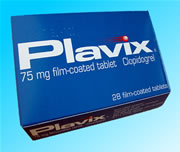|
The study, titled "A National Study of the Effect of Individual Proton Pump Inhibitors on Cardiovascular Outcomes in Patients Treated with Clopidogrel Following Coronary Stenting: The Clopidogrel Medco Outcomes Study" specifically focused on the effects of proton pump inhibitors (PPI) omeprazole (Prilosec), esomeprazole (Nexium), pantoprazole (Protonix), and lansoprazole (Prevacid), which together accounted for about 96% of PPI use in the study. Patients who receive a drug-eluting stent benefit from taking anti-clotting medications, including thienopyridines (such as clopidogrel or ticlopidine) and aspirin, for at least one year following the procedure. However, physicians often also prescribe PPIs to patients taking clopidogrel because of pre-existing stomach disease or to reduce the risk of common side effects such as nausea and gastroesophageal reflux (heartburn). Before clopidogrel can exert its anti-clotting effects, it must be converted from its inactive, pro-drug form to an active drug by enzymes in the liver. PPIs -- the sixth most commonly prescribed drug class in the U.S.—can interfere with those liver enzymes, according to the study. “Given the large number of patients who undergo coronary stent procedures each year, and the recommended and wide use of clopidogrel following this procedure, our findings have implications for many thousands of patients across the United States,” said Eric J. Stanek, PharmD, senior director of research, personalized medicine research and development, Medco Health Solutions, Franklin Lakes, NJ, and the study’s principal investigator. “Clopidogrel should continue to be taken as prescribed, and the need for PPI therapy should be carefully evaluated to ensure that it is prescribed only when clearly indicated.” The need to keep taking clopidogrel, as prescribed, and not to stop prematurely, was emphasized in comments by Dr. Stanek and Dr. Steven R. Bailey of the SCAI. The risk of stopping clopidogrel is much greater than the potential risks of taking PPIs. Dr. Bailey emphasized that the results of this study confirm concerns that have been discussed for some time, and that no emergency action is needed -- but that patients should discuss these issues with their cardiologists. For the study, researchers analyzed integrated data on pharmacy and medical claims from more than 10 million patients, including 16,690 patients taking clopidogrel for a full year following coronary stenting. Of these, 41% also took a PPI, on average, for more than nine months of the year. Over that 12-month period when patients took clopidogrel, investigators evaluated the risk of hospitalization for major adverse cardiovascular events (MACE), which they defined as a combination of heart attack, unstable angina, stroke or temporary stroke-like symptoms, repeat coronary procedures, or cardiovascular death. The overall MACE risk was 51% higher among patients taking any PPI. This composite risk was comprised of a 70% increase in the risk of heart attack or unstable angina, a 48% increase in the risk of stroke or stroke-like symptom and a 35% increase in the need for a repeat coronary procedure The findings were equally concerning when the effects of individual PPIs were analyzed. Omeprazole correlated with a 39% increased risk of MACE, esomeprazole to a 57% increased risk, pantoprazole to a 61% increased risk and lansoprazole to a 39% increased risk. All of the associations were highly statistically significant. Interestingly enough, the incidence of hospitalization for upper gastrointestinal bleeding was very small overall: only 1.1% among patients taking a PPI and 0.07% among those not taking a PPI. The Society for Cardiovascular Angiography and Interventions issued a statement reagrding the results of the study:
Additional research is needed to determine whether newer, less widely used PPIs such as rabeprazole (Aciphex) and dexlansoprazole (Kapidex) are also associated with increased cardiovascular risk in patients taking clopidogrel. Researchers are also interested in examining how genetic variations in the liver enzymes that activate clopidogrel might alter the impact of PPIs on clopidogrel effectiveness, the potential influence of the timing of PPI administration, the effect of alternate dosing of clopidogrel, and the comparative effectiveness of other anti-clotting medications. This study was supported independently by Medco Health Solutions, Inc, and conducted in collaboration with investigators from the Indiana University School of Medicine. Source: Society for Cardiovascular Angiography and Interventions (SCAI) with additional reporting by Burt Cohen, May 6, 2009 |

